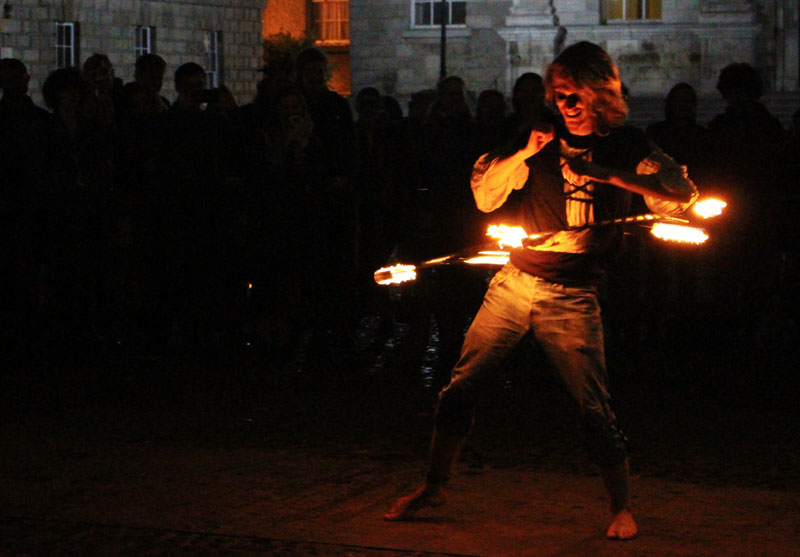Samhain, the day long multi-event run by Cumann Gaelach and Trinity’s Traditional Irish Music Society (Trad Soc) was dedicated to the Ireland of old. The cornerstone of the event was the trad gig held in Trinity’s chapel.
Attendants couldn’t help but fall in love with the venue as soon as they walked in the door. The chapel’s soaring ceiling and gorgeously decorated stage was further enhanced with scatterings of branches and soft lights, somehow giving the decadence a rustic, cosy, and almost homelike veneer. This mix of grandiosity and simplicity, aspiring to draw guests into the performances, pushed the idea that traditional music, songs and poems are not to be merely listened to, but to be fully experienced.
Kicking off with a short history lesson from Cumman na Gaelach’s Ciarán Wadd, the sizeable audience was pulled into the significance of Samhain in pre-colonial Ireland. The festival came at a key time for farmers, as Samhain marks the date that livestock was usually slaughtered for the winter. Beyond this, Samhain held a spiritually significant place in Irish culture, as a “time where the veil between our world and another world [wore] thin”. Interspersed with humour, this introduction let guests know that Samhain is meant to be enjoyed, whilst at the same time stripping back the modernity of Halloween – which originates from the practice of Samhain – to bring us back to our roots.
Featuring a mixture of music and poetry, Celtic culture was on display in a way many will rarely see. Acts with fiddles, concertinas, guitars and harps played tunes, both instrumental and as accompaniment to singers. Unamplified, intimate, and without frills and tricks, the music spoke for itself in the simplest of ways.
The most enjoyable thing about this gig was how the music transcended the language barrier. Regardless of one’s fluency in Irish, the emotion of the song, and the passion the performers had for their mother tongue, was self-evident. Again, this harkens back to the traditional idea of music that existed in Ireland – that one should surround themselves in it, and experience the music rather than just sit and listen.
Even if there were a few imperfections – always more noticeable in stripped-down gigs – these were few and far between. In trad music, the care and attention the performer give to their music is what carriers the music forward. With self-written pieces and a particularly powerful performance form soloist Éinne Ó Cathasaigh, this was present in abundance.
Throughout the gig were poetry readings. The first, with accompaniment from uilleann pipes, combined to create a wonderfully atmospheric performance. The second, read by Caolán MacGrianna, spoke of the times of the Penal Laws in Ireland, telling the story of an elderly man sacrificing himself to the British forces to save a young priest conducting an illegal mass.
Reading an incredibly moving piece, MacGrianna was backed up by quiet strains of an accordion, which drew the listener in and did the most to convey how Celtic culture, the whole reason for the Samhain festival, was once at risk of disappearing. Judging solely on what was on display in the chapel last night, this culture is alive and vibrant.
A thrilling set from Mark Moloney, Ríoghnach Hyland and Seamas Ó hAoláin combining flute, tin whistle and accordion in an ode to Mrs Doyle of Father Ted fame, closed out the gig. Taking to the podium before their last set of tunes, Maeve McCann of Trad Soc took the time to thank all the societies who were involved in making the chapel gig, and the entire Samhain festival, happen. If only we’d been able to thank her too, for last night was a truly a fantastic evening.
Correction: 20:51, November 1st, 2017
An earlier version of this article incorrectly stated that Caolán MacGrianna’s poem was an original piece. In fact, it was not. In an earlier version of this article, Caolán MacGrianna, Ríoghnach Hyland and Seamas Ó hAoláin’s names were all spelt incorrectly. These have now been corrected.







